-
Dream TimeChapters From the SixtiesFrom"Glamour"
When the future spoke—as it did every day now—it spoke through jukeboxes. In the paradise of affluence Dionne Warwick was always signing a Burt Bacharach song, as a Greek island came into view at starboard. The stars—movie actresses, pop singers, grizzled dissipated novelists, intellectual fashion designers—got hilariously drunk in ship’s bars, alternately fell half-naked down casino steps or announced their intention of filming the work of Genet or Ouspensky. The planet was their plaything. Having the power of free movement to and from anywhere, they jetted between Corfu and Bhutan and Seychelles, colliding briefly with one another to invent new psychic spaces, to share the new fun of the incandescent future.
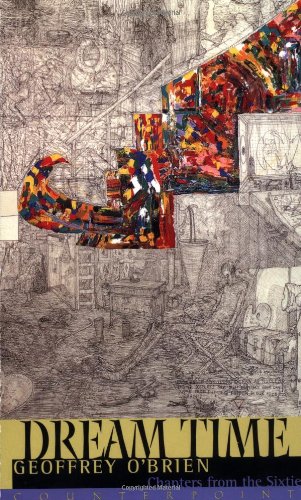 Dream Time : Chapters From the Sixties
Dream Time : Chapters From the Sixties -
Dream TimeChapters From the SixtiesFrom"The Myth of the Birth of the Hippie"
The rainbow shirts contrast effectively with the verdant lawn. The beautiful young people dance on the meadow in springtime. The pond nymph is radiant in the beflowered heat. A man sits on a rock and exhibits tranquility. Another man leaps in the air and exhibits exuberance. Man and woman and child sit naked on the grass to illustrate the familial tenderness of the new age. A goateed man, his hair in pigtails: the shaman. And so on: the juggler, the magician, the extravagant pirate, the spontaneous light-footed maiden symbolizing life energy. You get lost in the thick of it.
 Dream Time : Chapters From the Sixties
Dream Time : Chapters From the Sixties -
Dream TimeChapters From the SixtiesFrom"The Great Fear"
The killing and the talk of killing went on continuously now. Death, by assassination or suicide or police brutality or mistimed explosion of revolutionary matériel, had become a form of punctuation. Friends amazed themselves by making lists of the deaths. The only question was what could top what they had already witnessed. They felt ready for anything: plague, ice age, neo-Nazi putsch. Perhaps the recent cataclysms were part of a master plan to soften them up for the impending apocalypse—an event about which they grew more and more curious. If that was to be their fate, they might as well get on with it.
 Dream Time : Chapters From the Sixties
Dream Time : Chapters From the Sixties
Mary LaChapelle
-
House of HeroesAnd Other StoriesFrom"House of Heroes"
My job here is a strange one. The description I found in the classifieds read: “Overnight counselor-in-residence for developmentally disabled teenagers with behavior problems.” I didn’t know exactly what that meant. But it went on to read: “Some meal preparation required; counselor is able to sleep during shift.”
At the time it seemed that it might suit me, the sleeping part in particular.
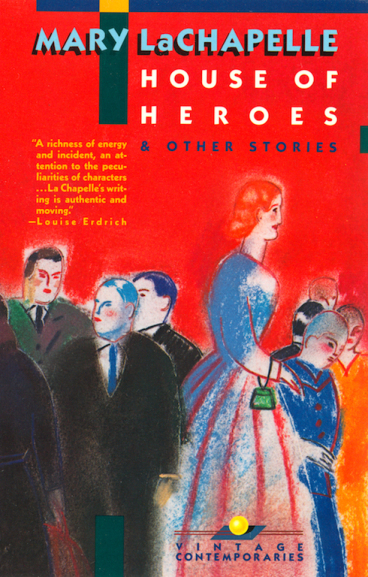 House of Heroes : And Other Stories
House of Heroes : And Other Stories- Print Books
- Find your local bookstore (via IndieBound)
- Powell's
- Barnes & Noble
- Alibris
- Abe Books
- E-Books
- Kobo
- Barnes & Noble
-
House of HeroesAnd Other StoriesFrom"Accidents"
“Hey!” I shouted, “slow down!”
“Dad!” he was calling. “There’s a guy!”
“What?”
“There’s a guy in the creek.” He was gulping.
“What are you saying?”
“It’s like he’s stuck under the bridge. He’s not moving.”
He led me on his bike back to the park. I didn’t call out to anyone to follow us. I think, like many others, I resist being alarmed until there’s no other choice.
 House of Heroes : And Other Stories
House of Heroes : And Other Stories- Print Books
- Find your local bookstore (via IndieBound)
- Powell's
- Barnes & Noble
- Alibris
- Abe Books
- E-Books
- Kobo
- Barnes & Noble
-
House of HeroesAnd Other StoriesFrom"Faith"
The girl, once she had reached the priest where he stood at the foot of the altar, took the host in her hand in the modern way. But instead of putting it in her mouth, she covered it with her other hand as if it were alive, like a grasshopper, and might escape. She walked away like this, and then, rather than turning down the aisle to return to her pew, she went straight ahead and pushed through the side door with her shoulder.
 House of Heroes : And Other Stories
House of Heroes : And Other Stories- Print Books
- Find your local bookstore (via IndieBound)
- Powell's
- Barnes & Noble
- Alibris
- Abe Books
- E-Books
- Kobo
- Barnes & Noble
Selected Works
read more >-
The Twenty-Seventh CityA Novel
The thing was, Luisa had been bored. She’d been bored since she got back from Paris. She’d been bored in Paris, too. In Paris, people kissed on the boulevards. That was how bored they were. She’d participated in the Experiment in International Living. It had produced Negative Results. Her Experiment family, the Girauds, had apparently been specific about requesting a boy, an American boy. Luisa felt like a midlife “mistake” on the part of Mme Giraud. She’d eavesdropped on Mme Giraud in conversation with her neighbors. The neighbors had been expecting a boy.
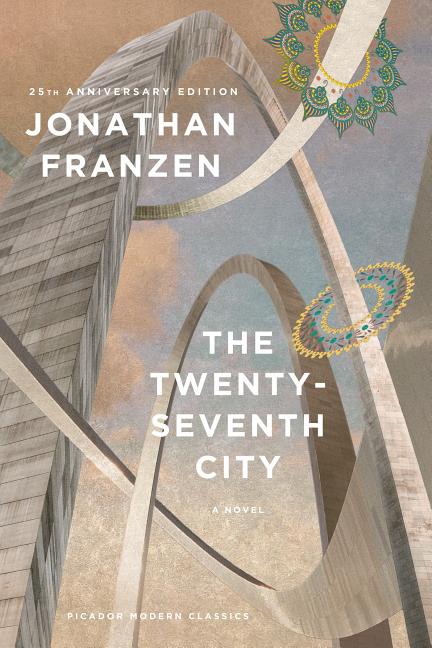 The Twenty-Seventh City : A Novel
The Twenty-Seventh City : A Novel -
The Twenty-Seventh CityA Novel
The city heaves north. Flashing strings of lights become jets as they drop to plowed runways. The Lambert Airport crowd is thinning fast. Hugs happen, opening like sudden flowers, in concourses, at gates and checkpoints, a blossoming of emotion. Flight attendants wheeling luggage are crabby. Taxis are leaving without fares. From her room the addict looks out on the air traffic with the uncritical gaze of someone viewing a nature scene, cows grazing, trees shedding leaves, jets rising, falling, banking. She lights a cigarette and sees her last one still burning in the ashtray. From a shoebox shrine she takes a long letter dated December 24, 1962, and reads it for the twentieth time while she waits for Rolf, who might, she thinks, arrive any moment.
 The Twenty-Seventh City : A Novel
The Twenty-Seventh City : A Novel -
The Twenty-Seventh CityA Novel
…the Jammusiasm spread. It spread through the young people, the high-school and college kids. Somehow the Chief always found time to play to yet another crowd of young people. She spoke at concerts and basketball tournaments, at science fairs and Boy Scout expositions, at student art shows and Washington University debates. Her messages were contingent on the circumstances. Science is important, she would seem to say. Sports are important. Boy Scouts are important. Chess is important. Civil rights are important… Wherever she went there were cameras and reporters, and it was they who sent her message to the youths: I am important.
 The Twenty-Seventh City : A Novel
The Twenty-Seventh City : A Novel
Selected Works
read more >-
Tuxedo JunctionEssays on American Culture
It is not the primary thrust or purpose of these essays to serve as autobiography. The strictly autobiographical portions are to be approached with caution. This is not to suggest that they are not true, but veracity is hardly the issue or the point. The autobiographical parts often serve the same purpose as notes in a symphony or passage of music: simply to get from one place to another. The personage I am in some of the essays, to borrow Henry Adams’s metaphor, is simply a manikin on which I model some suitable clothes for the occasion… I am a critic and it is best for the reader never to forget that, even if at times I appear to be playing other roles.
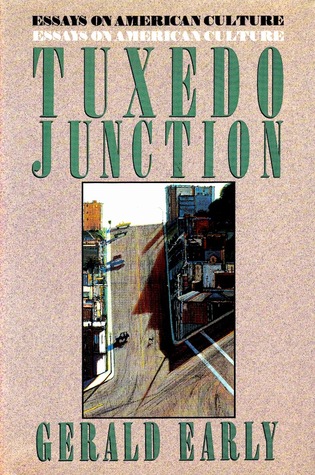 Tuxedo Junction : Essays on American Culture
Tuxedo Junction : Essays on American Culture- Print Books
- Find your local bookstore (via IndieBound)
- Powell's
- Barnes & Noble
- Alibris
- Abe Books
- E-Books
- Kobo
- Barnes & Noble
-
Tuxedo JunctionEssays on American CultureFrom"Waiting for Miss America"
I heard several black men on a local black radio call-in program complain rather vociferously the Monday following the Miss American pageant. One caller, who writes for the local black newspaper, thought Ms. Williams to be “politically unaware” because she refused to be a spokesperson for her race, and he considered her “ a liability to the black community.” Another caller voiced the opinion that the selection of Williams as Miss America was further proof that white America wished to denigrate black men by promoting black women. It is with a great degree of dire anticipation that I await the response from these quarters once it becomes generally known that Ms. Williams has a white boyfriend. She will no longer be simply “politically unaware” or “an insulting hindrance to the ascendancy of black men”; she will be a traitor, “sleeping with the white boy just like the slave women used to do on the plantation.”
 Tuxedo Junction : Essays on American Culture
Tuxedo Junction : Essays on American Culture- Print Books
- Find your local bookstore (via IndieBound)
- Powell's
- Barnes & Noble
- Alibris
- Abe Books
- E-Books
- Kobo
- Barnes & Noble
-
Tuxedo JunctionEssays on American CultureFrom"Langston Hughes Festival Keynote Lecture"
If he had written nothing but poetry he would have been one of the most renowned writers in twentieth-century America. But Hughes also wrote novels, short stories, travel pieces, translations, plays, scripts, song lyrics, and journalism. And he managed this kind of productivity while still maintaining an extremely energetic social life and conducting extensive lecture tours. Hughes almost never refused to read his poetry at any sort of institution, a college, an elementary school, a retirement home, a cocktail party, on a street corner. And he did not let a little matter like someone’s inability to pay his fee stop him from appearing. He was virtually a literary Johnny Appleseed, dropping poems on the public as if, when he awoke every morning, he could comb them out of his hair.
 Tuxedo Junction : Essays on American Culture
Tuxedo Junction : Essays on American Culture- Print Books
- Find your local bookstore (via IndieBound)
- Powell's
- Barnes & Noble
- Alibris
- Abe Books
- E-Books
- Kobo
- Barnes & Noble
Selected Works
read more >-
The World as I Found ItA Novel
Even as they entered, he could feel the place envelop him like a vapor with a smell of heavy, overcooked food, privation and dust. The lady taking tickets, old and wigged, with big bosoms, conspicuously switched from Yiddish to German, putting the interlopers on notice that they had been spotted. Eyeing the overblown placard for the play, showing a giant Jew with maniacal eyes throttling some stricken Gentile, he again wondered, Why did they huddle so, these people? And all the while he kept hearing this coarse, splattery jargon, so animated, with that catarrh as though a fishbone were stuck in the throat. There was a man selling hot tea from a samovar and another vending sticky cakes and ices. And the eating—everybody eating, gnawing apples and chewing sweet crackling dumplings from greasy sheets of brown paper. And that marshy barn-warmth of people huddling. It was too close for him.
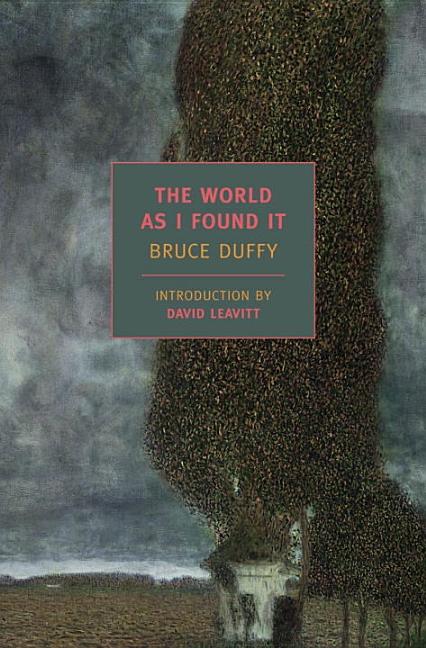 The World as I Found It : A Novel
The World as I Found It : A Novel -
The World as I Found ItA Novel
At least Russell felt he had allies and forebears. Unlike Wittgenstein, he saw himself as part of a tradition, one of a line of thinkers who had stared at various walls, wondering what remained to be done—or more likely demolished.
By persistence or brute force a wall might be assaulted, but it would not be breached by imagining it was not really so high or formidable. Still, even Wittgenstein would wonder at times if a given wall even existed—that is, if a problem was truly a philosophical problem, and not instead one of the wards of psychology or science. Russell, by contrast, was more wily. Philosophy, he would say with a wink, was traditionally a case of weighing theft—the theft of assumptions and givens—over honest toil. Wittgenstein despised this attitude. He said the problems must be squarely confronted, not sent a Trojan horse. And here Wittgenstein would see himself as both the betrayed and the betrayer, knowing, as Russell did not, that their walls were really quite different. Shameful arrogance, but true, Wittgenstein would think. Russell did not have his ear to this wall, and if he did, he could not hear it surging with the outer sea.
 The World as I Found It : A Novel
The World as I Found It : A Novel -
The World as I Found ItA Novel
Looking out the window as the train crept into Vienna, Wittgenstein could see the massive city huddled under clumps of low winter clouds. A smoky bluish gray in his memory, Vienna now seemed singed at the edges like an old photograph, everything begrimed from the cheap coal they were forced to burn, when coal was available at all. In the station, with its resounding marble ceilings, the lights flickered ominously and the marble stairs echoed with wooden-soled shoes, leather, like most other commodities, being increasingly unobtainable. By the men’s room, a pudgy man with a soiled suit darted out from a vestibule. Sir, he hissed. Do you have any cocoa, spirits or other foodstuffs you might like to sell or trade? The man opened a valise crammed with cans and packages. Look. I have some lovely bacon and tinned milk. Choice tobacco? Silk for your girl?
 The World as I Found It : A Novel
The World as I Found It : A Novel
Selected Works
read more >-
Break It DownStoriesFrom"What She Knew"
People did not know what she knew, that she was not really a woman but a man, often a fat man, but more often, probably, an old man. The fact that she was an old man made it hard for her to be a young woman. It was hard for her to talk to a young man, for instance, though the young man was clearly interested in her. She had to ask herself, Why is this young man flirting with this old man?
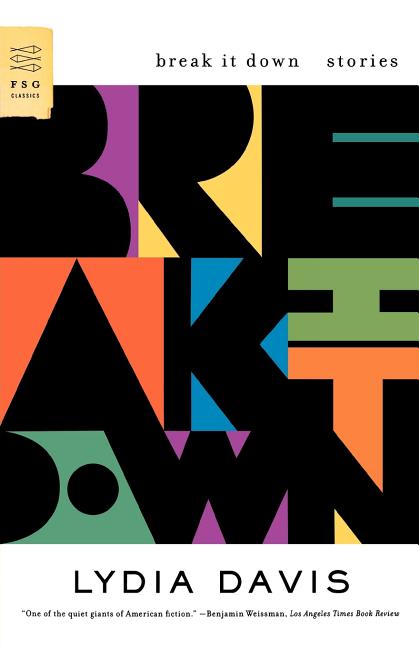 Break It Down : Stories
Break It Down : Stories -
Break It DownStoriesFrom"City Employment"
All over the city there are old black women who have been employed to call up people at seven in the morning and ask in a muffled voice to speak to Lisa. These women are part of a larger corps of city employees engaged to call wrong numbers. The highest earner of all is an Indian from India who is able to insist that he does not have the wrong number.
 Break It Down : Stories
Break It Down : Stories -
Break It DownStoriesFrom"The Housemaid"
For years we have lived together in the basement. She is the cook; I am the housemaid. We are not good servants, but no one can dismiss us because we are still better than most. My mother’s dream is that someday she will save enough money to leave me and live in the country. My dream is nearly the same, except that when I am feeling angry and unhappy I look across the table at her clawlike hands and hope that she will choke to death on her food. Then no one would be there to stop me from going into her closet and breaking open her money box. I would put on her dresses and her hats, and open the windows of her room and let the smell out.
 Break It Down : Stories
Break It Down : Stories
Selected Works
read more >-
Low LifeLures and Snares of Old New York
Rat-baiting was the premier betting sport of the nineteenth century. Its prestige can be gauged in economic terms, circa 1875: admission to a then illegal prizefight between humans cost fifty cents, to dogfights and cockfights $2, while a fight pitting a dog against rats ran anywhere from $1.50 if the dog faced five rats or fewer, up to $5, in proportion to the number of rats. In the eighteenth century the biggest draw had been bearbaiting, but that sport gradually dissipated as the number of available bears decreased, although matches continued to be held up to the Civil War, notably in McLaughlin’s bear pit at First Avenue and Tenth Street. For a while, dog-vs.-raccoon contests were popular, but rats were so readily available that they came to dominate the scene; boys were paid to catch them, at a rate of five to twelve cents a head.
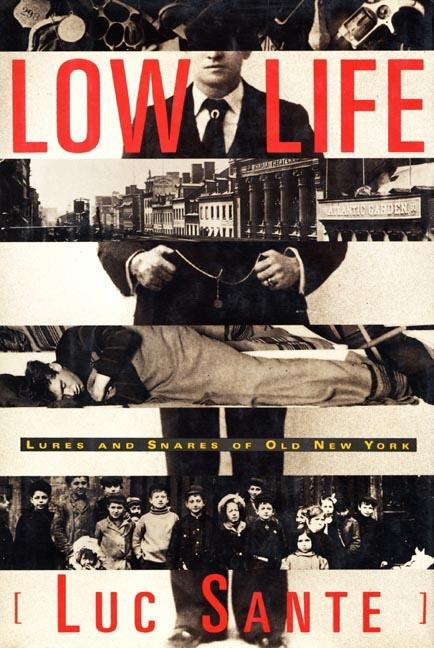 Low Life : Lures and Snares of Old New York
Low Life : Lures and Snares of Old New York -
Low LifeLures and Snares of Old New York
More sophisticated was the badger game. The gangster Shang Draper, for example, ran a saloon on Sixth Avenue and Twenty-ninth Street where clients were, by fair means or foul, gotten very drunk. When a customer was sufficiently intoxicated, he would be lured by one of the staff of forty female employees down to a whorehouse on Prince and Wooster Streets. Very near the climatic moment of his encounter with the woman, an angry man would burst in through the door. He was, he would declare, the woman’s husband. Enraged by the evidence of adultery, he would threaten to beat the customer senseless, to kill him, to take him to court. But perhaps, he would hint, he could be mollified, for a significant financial consideration. Identical scenes would meanwhile be taking place in every other room in the joint.
 Low Life : Lures and Snares of Old New York
Low Life : Lures and Snares of Old New York -
Low LifeLures and Snares of Old New York
The corruption of the Tweed regime extended from top to bottom and penetrated every corner of the city’s structure. Small-time crooks suddenly became untouchable, and often found themselves with governmental sinecures. A mayhem artist and gambler named Tim Donovan became deputy clerk at Fulton Market; the comedian “Oofty Goofty” Phillips was made clerk to the Water Register; the crook Jim “Maneater” Cusick became a court clerk. Under Tweed, the city spent $10,000 on $75 worth of pencils, $171,000 for $4,000 in tables and chairs, and squandered some $12 million on the infamous courthouse behind City Hall, including $1,826,000 for a $50,000 plastering job, $7 million for furniture and decorations, and roughly $3,500,000 for alleged repairs in the first thirty-one months after the building’s completion.
 Low Life : Lures and Snares of Old New York
Low Life : Lures and Snares of Old New York
Selected Works
read more >-
Great PlainsEssays
I did not know one person in Montana. I sat in the house and tried to write a novel about high school; I went for walks, drank quarts of Coors beer, listened to the radio. At night, a neighbor’s horse shifted his weight from hoof to hoof out in the trees, and sometimes cropped grass so near I could hear him chew. The first snowstorm blew in from the north, and crows crossed the sky before it like thrown black socks. For years in New York I had dreamed of Montana. Actually, I had also dreamed of joining the Army, going to truck-driving school in New Jersey, building a wooden sailboat, playing the great golf courses of the world, and moving to Fiji. I had examined all those ideas and then rejected them. Montana made the most sense to me.
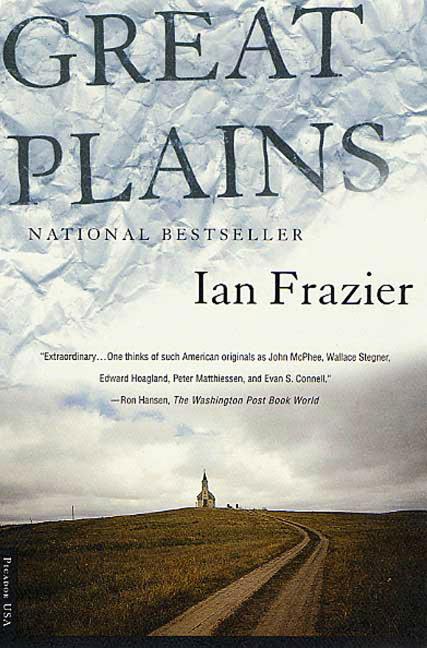 Great Plains : Essays
Great Plains : Essays -
Great PlainsEssays
Whenever I stopped for gas, I always asked the name of the local high-school team. I never found a person working in a gas station, convenience store, or truck stop who didn’t know. In Deer Lodge, Montana, the team is called the Wardens; Deer Lodge is the home of the state prison. In Havre, Montana, the team is the Havre Blue Ponies. In Newcastle, Wyoming, it’s the Newcastle Dogies. In Brush, Colorado, it’s the Brush Beet Diggers. Beaver, Oklahoma, has the Dusters; Oakley, Kansas, the Plainsmen; McCamey, Texas, the Badgers; Tucumcari, New Mexico, the Rattlers; Matador, Texas, the Matadors. Colby, Kansas; Eads, Colorado; Hondo, New Mexico; and Pecos, Texas, all call themselves the Eagles. Chappell, Nebraska; Rush, Colorado; and Chugwater, Wyoming, all are the Buffalos. At a gas station near an Indian reservation in Montana, a white gas-station attendant told me that Indian basketball teams are easy to beat. He said all you have to do is punch one guy, and then the whole team will attack you and get kicked out of the game.
 Great Plains : Essays
Great Plains : Essays -
Great PlainsEssays
Joy! I leaned against the sturdiness of the McGhee sister by my side. From the wooden floor came a dust that smelled like small towns. Thoughts which usually shout down joy in me were nowhere in sight. I read in some magazines once that the most important word in American movies is “home”; that Americans, being immigrants, have strong associations with that word. The Robinson sisters turned and did a move that was mostly from the knees down. I was in the middle of America, in the middle of the Great Plains, in the midst of history, in the valley of the Solomon River, in the town of Nicodemus: in my mind, anyway, home.
 Great Plains : Essays
Great Plains : Essays
Selected Works
read more >-
Rainy SeasonHaiti - Then and Now
…after dozens of visits, I stopped buying the paintings. Scenes of bright peasant life, or lovely little children in uniforms filing into school, pictures of grand bourgeois families dancing in a hall beneath towering hi-fi speakers, or of shocking voodoo ceremonies in blacks and reds with decapitated chickens flapping in blood and women writhing, panoramas of bustling, abundant markets, paintings of primeval forests, with lions, giraffes, panthers and other animals no Haitian has ever seen at home, where the wildest animal is the crocodile or the flamingo, or the tarantula. It’s hard to keep looking at those paintings, but these Haitian artists paint them over and over again, as though they can’t get this nightmare out of their system. For months, a vendor tried to sell me this one painting, of a church interior, because I made the mistake of looking at it. He started at thirty dollars, laughably high but negotiable. Still, for a long time I couldn’t bring myself to buy it, no matter how badly the stooped and stuttering art dealer wanted to get rid of it, no matter how low he would go. I had promised myself no more paintings.
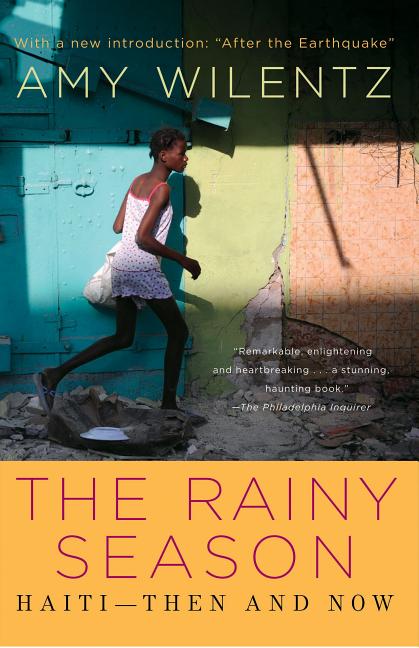 Rainy Season : Haiti - Then and Now
Rainy Season : Haiti - Then and Now -
Rainy SeasonHaiti - Then and Now
People whose dead have enemies resort to all sorts of tricks to stop their deceased relation from being turned into a zombi. They build strong graves of stone; often the construction begins long before the death—the costs are high, but it’s worth it to avoid becoming a zombi. The dead man’s people throw rice into his casket, so that the deceased will have to count each grain, and because he is concentrating on the counting he will not respond to the bokor’s call to arise. They seal the corpse’s nostrils to stop his soul from escaping. But if, by some ruse, the bokor manages to trap the dead man’s soul, the game is up. The zombi rises, and thenceforth he must serve the bokor, or whoever has commissioned the zombification, as a virtual slave.
 Rainy Season : Haiti - Then and Now
Rainy Season : Haiti - Then and Now -
Rainy SeasonHaiti - Then and Now
The brigades had erected barricades throughout her neighborhood to stop the Macoutes and the Army from driving through at unsnail-like top speed and spraying the houses with machine-gun fire, as they had done in other neighborhoods and in other towns. We got to one barricade, and I couldn’t go around it. Worse, I was suddenly unable, in my panic, to put the car into reverse. It was a new car. My colleagues in the backseat were screaming, “Journalis! Journalis!” at the boys at the barricade, but the boys had seen a car where there should have been no cars, and they came around the barricade with their rocks, and it was only seconds that I found reverse and got us out of there.
My colleagues were not pleased.
“Learn to drive,” said the Chicago Tribune.
 Rainy Season : Haiti - Then and Now
Rainy Season : Haiti - Then and Now
Selected Works
read more >-
The Animal EstateThe English and Other Creatures in Victorian England
When in 1679 a London woman swung at Tyburn for bestiality, her canine partner in crime suffered the same punishment on the same grounds. King James I ordered a bear that had killed a child to be baited to death, and rural shepherds frequently hanged dogs caught worrying their flocks. The Merchant of Venice included a reference to “a wolf, hanged for human slaughter” sufficiently cursory to suggest that Shakespeare’s audience recognized animals as appropriate participants in formal judicial proceedings.
 The Animal Estate : The English and Other Creatures in Victorian England
The Animal Estate : The English and Other Creatures in Victorian England -
The Animal EstateThe English and Other Creatures in Victorian England
The ultimate measure of the tiger’s unregeneracy was its fondness for human flesh. Many tigers living in the populated parts of India and Ceylon routinely preyed on domestic animals and occasionally became man-eaters. Some turned to human prey because they were too sick or old to catch faster and less dangerous quarries. Most, however, were thought to be “cattle-lifting tigers” who had once “summoned up courage to attack the herdsmen,” and thereby added a tasty new item to their diet.
 The Animal Estate : The English and Other Creatures in Victorian England
The Animal Estate : The English and Other Creatures in Victorian England -
The Animal EstateThe English and Other Creatures in Victorian England
The most natural way for most visitors to interact with the animals was to feed them, an act which symbolized both proprietorship and domination. Most zoos encouraged this activity. The first elephants in the collection of the London Zoo were reported to “have a keen relish for buns and biscuits, which are vended on the spot for their benefit and the gratification of visitors.” Their successors shared the same tastes. When the celebrated Jumbo was about to depart for the United States, his admirers expressed their regret with farewell gifts including fruit, cake, oysters, and a variety of alcoholic beverages.
 The Animal Estate : The English and Other Creatures in Victorian England
The Animal Estate : The English and Other Creatures in Victorian England